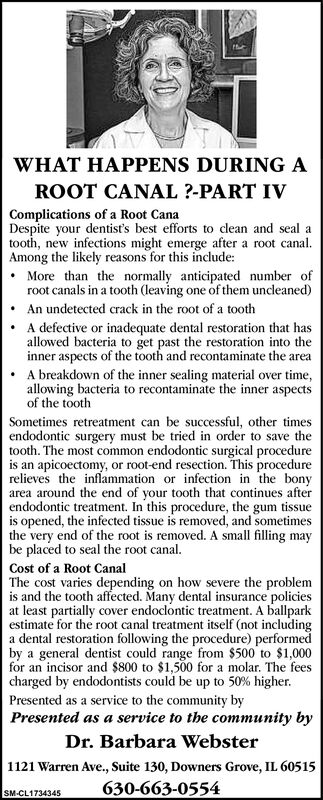Advertisement

-
Published Date
January 30, 2020This ad was originally published on this date and may contain an offer that is no longer valid. To learn more about this business and its most recent offers, click here.
Ad Text
WHAT HAPPENS DURINGA ROOT CANAL ?-PART IV Complications of a Root Cana Despite your dentist's best efforts to clean and seal a tooth, new infections might emerge after a root canal. Among the likely reasons for this include: More than the normally anticipated number of root canals in a tooth (leaving one of them uncleaned) An undetected crack in the root of a tooth A defective or inadequate dental restoration that has allowed bacteria to get past the restoration into the inner aspects of the tooth and recontaminate the area A breakdown of the inner sealing material over time, allowing bacteria to recontaminate the inner aspects of the tooth Sometimes retreatment can be successful, other times endodontic surgery must be tried in order to save the tooth. The most common endodontic surgical procedure is an apicoectomy, or root-end resection. This procedure relieves the inflammation or infection in the bony area around the end of your tooth that continues after endodontic treatment. In this procedure, the gum tissue is opened, the infected tissue is removed, and sometimes the very end of the root is removed. A small filling may be placed to seal the root canal. Cost of a Root Canal The cost varies depending on how severe the problem is and the tooth affected. Many dental insurance policies at least partially cover endoclontic treatment. A ballpark estimate for the root canal treatment itself (not including a dental restoration following the procedure) performed by a general dentist could range from $500 to $1,000 for an incisor and $800 to $1,500 for a molar. The fees charged by endodontists could be up to 50% higher. Presented as a service to the community by Presented as a service to the community by Dr. Barbara Webster 1121 Warren Ave., Suite 130, Downers Grove, IL 60515 630-663-0554 SM-CL1734345 WHAT HAPPENS DURINGA ROOT CANAL ?-PART IV Complications of a Root Cana Despite your dentist's best efforts to clean and seal a tooth, new infections might emerge after a root canal. Among the likely reasons for this include: More than the normally anticipated number of root canals in a tooth (leaving one of them uncleaned) An undetected crack in the root of a tooth A defective or inadequate dental restoration that has allowed bacteria to get past the restoration into the inner aspects of the tooth and recontaminate the area A breakdown of the inner sealing material over time, allowing bacteria to recontaminate the inner aspects of the tooth Sometimes retreatment can be successful, other times endodontic surgery must be tried in order to save the tooth. The most common endodontic surgical procedure is an apicoectomy, or root-end resection. This procedure relieves the inflammation or infection in the bony area around the end of your tooth that continues after endodontic treatment. In this procedure, the gum tissue is opened, the infected tissue is removed, and sometimes the very end of the root is removed. A small filling may be placed to seal the root canal. Cost of a Root Canal The cost varies depending on how severe the problem is and the tooth affected. Many dental insurance policies at least partially cover endoclontic treatment. A ballpark estimate for the root canal treatment itself (not including a dental restoration following the procedure) performed by a general dentist could range from $500 to $1,000 for an incisor and $800 to $1,500 for a molar. The fees charged by endodontists could be up to 50% higher. Presented as a service to the community by Presented as a service to the community by Dr. Barbara Webster 1121 Warren Ave., Suite 130, Downers Grove, IL 60515 630-663-0554 SM-CL1734345
